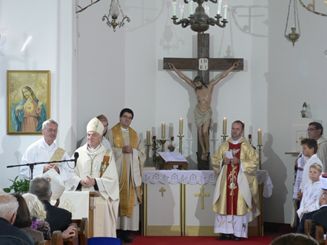The Old Catholic church in Zagreb, Croatia, celebrated a special anniversary on 22 September 2013: 90 years since a Roman Catholic reform movement elected and consecrated its own bishop (Marko Kalogjera) and joined the Union of Utrecht as a separate Old Catholic church.
Both Bishop Dr. John Okoro (responsible for the church in Croatia) and the Archbishop of Utrecht, Dr. Joris Vercammen, were invited to Zagreb to mark the occasion. Bishop Okoro and I travelled to Zagreb in my car on Friday 20 September to meet the synod standing committee and to help prepare the celebratory service. The chairman of the synod standing committee, Professor Damir Boras, is a grandson of Croatia’s first Old Catholic bishop. Bishop Bernhard Heitz (responsible for the church in Croatia until 2010) and his wife Monika arrived the following day, as did Archbishop Joris. Together we celebrated the Eucharist in the recently renovated church in Stenjevec, a suburb of Zagreb, on Sunday. We were joined by the Revd Nassouh Toutoungi from Switzerland, representing the “Partner Sein” organisation. The service took a slightly modified form of the old rite of the Croatian church. The Revd Darko Mejaški from Zagreb, the Revd Stjepan Topolski from Šaptinovci and the Revd Erich Ickelsheimer from Klagenfurt celebrated the liturgy with the three bishops.
The entire service, which featured music from the Old Catholic choirs of Zagreb and Šaptinovci, was broadcast live on Croatian television. Official representatives of Zagreb, Croatia and other Christian denominations were in attendance  alongside the highest representative of Islam in Croatia, Mufti Aziz ef. Hasanoviæ, who once studied at the Catholic Faculty of Zagreb University. After the service we were welcomed at the church hall, where we had the opportunity to talk to other guests. Many of the attendees then had lunch together at a nearby hotel. It was surprising and encouraging to see the high regard for the small Old Catholic community in Croatia among other denominations and religions. For the Croatian Old Catholics it was a great honour to be visited by three bishops, among them the Archbishop of Utrecht. Following periods of turbulence and persecution, the community today is not only alive but growing. Led by the Revd Mejaški, the Old Catholic church in Zagreb is a visible and audible player in the concert of churches and religions in Croatia.
alongside the highest representative of Islam in Croatia, Mufti Aziz ef. Hasanoviæ, who once studied at the Catholic Faculty of Zagreb University. After the service we were welcomed at the church hall, where we had the opportunity to talk to other guests. Many of the attendees then had lunch together at a nearby hotel. It was surprising and encouraging to see the high regard for the small Old Catholic community in Croatia among other denominations and religions. For the Croatian Old Catholics it was a great honour to be visited by three bishops, among them the Archbishop of Utrecht. Following periods of turbulence and persecution, the community today is not only alive but growing. Led by the Revd Mejaški, the Old Catholic church in Zagreb is a visible and audible player in the concert of churches and religions in Croatia.
The following day I travelled across Slavonia with Bishop Okoro and Archbishop Vercammen to the village of Šaptinovci, close to Našice, where we received an overwhelming welcome. The majority of the population of Šaptinovci is Old Catholic. The Revd Stjepan Mejaški, who has been active in Šaptinovci for over 40 years, and his team successfully maintain a lively, very active parish. Although it was a Monday, the service we held there was well attended. It was followed by a lovingly prepared lunch in the parish hall, attended by the local mayor. We were very sorry that we could not stay and enjoy the warm hospitality for longer, but we had to continue on our journey to the village of Dubrave Donje near Tuzla in Bosnia.
After a two-hour drive through south-eastern Slavonia, we arrived at the Bosnian border at Bosanski Šamac and then continued through the “Republika Srpska”, the Serbian part of Bosnia. An hour later we reached Doboj in the Muslim-Croat Federation, and after one more hour we came to Živinice, near Tuzla. There we had dinner and a long talk with the curate Revd Mario Èengiæ, representatives of the local parish of Dubrave Donje, and a lawyer. The Revd Èengiæ took office just over a year ago after problems with the previous priest led to a breaking-off of relations and the priest’s  dismissal. It was midnight before we finally went to bed.
dismissal. It was midnight before we finally went to bed.
The next day was a special day in Dubrave Donje: the first time an Archbishop of Utrecht had visited the parish there. Here too, the church was full for a service of confirmation led by Archbishop Vercammen. Among the people attending were the local Roman Catholic priest, a number of imams and the local mayor. Afterwards there was time for discussions that gave the archbishop new insights into the situation of the local Old Catholics. It was remarkable to see how highly this tiny group is regarded, especially by the Muslim majority. As the bishop responsible for the Old Catholics in Bosnia-Hercegovina, Bishop Okoro thanked the representatives of the country and the  religious community for their support and friendly relations.
religious community for their support and friendly relations.
After a lunch prepared by members of the parish, we visited the home of the Revd Mario Èengiæ, blessed the cemetery and had a very interesting meeting at the Muslim centre of Živinice. There, Imam Mehmet ef. Butkoviæ showed us around the mosque and the centre, which also houses a tekije,a prayer centre for the Naqšbandi dervish order.
Relations between Christians and Muslims in Croatia and Bosnia-Hercegovina are far friendlier and more constructive than in most other European countries, even though it is less than 20 years since the Yugoslav Wars, in which many Muslims lost their lives, took place. Western Europe can learn a great deal from this region. The warm hospitality and the friendliness with which the Muslim clerics welcomed our group made a lasting impression on all of us.
Deacon Georg Spindler, Rosenheim

